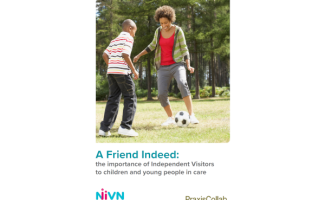What is the role of an Independent Visitor?
An Independent Visitor (IV) is a volunteer who visits and befriends a child or young person living in care. Children and young people in care have often experienced trauma and a lack of consistent adult relationships. The IV may be the one constant adult they have in their life.
The unique role of an IV enables children and young people to have at least one consistent, trusting relationship that is built over time. The IV will endeavor to become and remain a stable adult in the child’s life who doesn’t change when placements or social workers change and will at all times stay child focused.
Independent Visitors take an interest into the lives, hopes and concerns of a child or young person, and are there to listen and most of all have fun. Children and young people report that the role can make a huge difference to their lives; it improves confidence, they feel valued and they get to create happy memories with their IV.
The following video from Leicestershire’s IV service explains what an IV does perfectly:
Despite the huge benefits the role can bring, only a tiny proportion of children and young people living in care have an IV. This is despite ‘The Children Act’ (1989) requiring the appointment of an IV if deemed to be in the child’s best interests.
We are therefore campaigning to increase the number of IVs nationally, so that more children and young people in care benefit from this valuable opportunity. IVs report getting immense value, experience and satisfaction from the role personally. They come from all walks of life, with lots of different interests and experiences.
Firstly, they have fun with the child or young person they are matched with. They will spend time together doing activities they enjoy.
Here are some things that you may do with the child or young person you are matched with:
- Cinema
- Sporting activities
- Museums/exhibitions
- Theatre
- Zoo
- Theme parks/fun fairs
- Go out for dinner
- Sight seeing in different places
They also play an important part in the child or young person’s social, emotional and educational development by offering them support and advice, listening to them and empowering them to make sure their rights are respected.
Most IV’s meet with the child or young person once or twice a month for a few hours. This provides consistency and enables trust to be built.
Times and frequency of visits are agreed between the IV and the child or young person. There will also be an IV Coordinator who will support with this. Visits may be short at the beginning of the relationship, so that you can get to know each other at a pace suited to the child or young person’s needs.
All children and young people waiting for an Independent Visitor are in care, this mean they are looked after by the local authority.
Some children and young people will be outgoing and easy to build a trusting relationship with, but others may be shy and anxious, so building a relationship may take more time. Some children and young people will be having some trouble within school or college, others will not. Some children and young people will be facing emotional problems.
All children and young people are unique and have amazing talents and skills, which they may not have even discovered yet. You can help this by building positive relationships, and just being there for them. You can make a real difference to the lives of these children and young peoples.
Being an IV requires commitment. National guidance recommends that an Independent Visitor should volunteer for a minimum of a year. Some local IV Services may ask for a longer commitment. This is because the children and young people have all been through very difficult times, so building a trusting relationship may take time. Some IV relationships with children or young people have lasted for years, even after the child or young person leaves the care system. In many other cases the relationship comes to a natural end as circumstances change.





